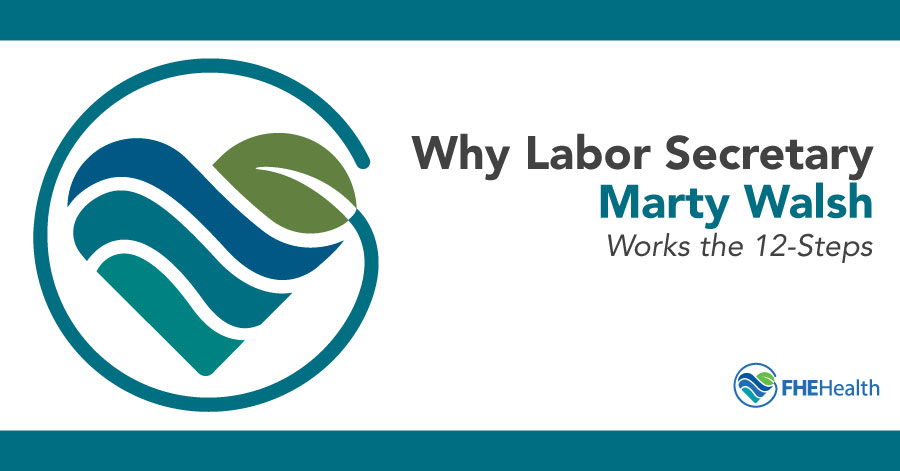
Most addiction stories we hear about take place in Hollywood, where the all-too-familiar tales about celebrities take center stage. However, you don’t have to be a big name in show business to face challenges with drugs and alcohol. Similarly, you don’t have to be famous to craft your own story of triumph over addiction. As the 29th U.S. Secretary of Labor, Marty Walsh carries his own name recognition. After a look at his story, you’ll see that both his challenges and his victories are uniquely his own but offer lessons anyone can learn from.
Who Is Marty Walsh?
Marty Walsh is now known as Joe Biden’s Secretary of Labor, but it was a long road for him to get where he is today. Born in the Dorchester neighborhood of Boston to Irish immigrants, he was diagnosed with Burkitt’s lymphoma at age seven. Early on, Marty understood health challenges and the social isolation that comes with years of treatment. It was only at age 11 that he was declared cancer-free.
A Career in Politics and a Battle Against Alcoholism
Marty Walsh’s career began after he graduated from Boston College with a Bachelor of Arts degree. Shortly thereafter, he joined the Laborers’ International Union of North America at age 21 and went on to become its president. Nine years later, in 1997, he entered politics as a state representative. At this point, Marty was already relying on alcohol to unwind from the stressful life of a rising politician. However, it wasn’t until 2014, when he became Boston’s 54th mayor, that he went public with his battle against alcoholism.
Marty Walsh, Addiction Recovery Success Story
Marty served as the mayor of Boston for seven years. During his time in office, he counted his discussions with young people on the topic of substance abuse among his greatest successes. Over the course of his term as mayor, his past experiences with alcoholism helped shape his policy-making. He made addressing the local opioid crisis one of his main priorities. He also offered support to those struggling with recovery by creating the first municipal Office of Recovery Services.
Today, the City of Boston has one of the strongest substance abuse support systems in the country. Now, as the U.S. Secretary of Labor, Walsh’s past struggles with substance abuse continue to shape his views. At the foundation of his career as a politician is his belief that everyone deserves a second chance.
How a Leader Recovers From Alcoholism
Overcoming his addiction to alcohol was a lifelong struggle for Marty Walsh. His recovery came only with the help of friends and family and the guidance of those who had faced similar challenges. While in many ways his story is uniquely his own, Marty has always emphasized the commonalities he shares with everyday people. This began in the early stages of his recovery and continues today with his abstinence from alcohol.
12-Step Programs
For Marty Walsh, 12-step programs represent the most effective and reliable way to recover from alcohol addiction. However, he fully acknowledges that these and other alcoholism recovery programs aren’t surefire solutions to achieve sobriety. Instead, they’re principles to live one’s life by. Even today, after a full two decades on his recovery journey, Marty Walsh openly describes himself as an alcoholic. He admits that the addiction recovery process is never truly over.
Part of the reason a 12-step program appealed to Marty was the emphasis it placed on both community and spirituality. It was only by connecting with the people around him that he found the strength to conquer the challenges he faced with alcohol. Today, he continues to recommend 12-step programs to those facing their own addiction challenges.
Recovery in the Public Eye
What makes Marty Walsh’s alcoholic recovery story different from many others is that he faced his challenges openly and in public. This first began when he decided to run for mayor of Boston. As a seasoned politician, Marty understood how his history of substance abuse could affect his chances of winning the election. Despite this, he felt strongly that maintaining a policy of openness was the best way to earn voters’ respect.
In the end, his decision paid off, and to this day he’s admired as a public servant with integrity and honesty. In recent years, he’s used his public platform to continue the dialogue he started long ago. He frequently gives guidance and hope to those who continue to battle alcoholism and substance abuse.
Learning From Marty’s Story
Even if we don’t live in the public eye like Marty Walsh, we can learn valuable lessons from his story. Often, it’s easy to convince ourselves that challenges like addiction are something we can handle on our own. However, for those who’ve tried it, this is often not the case. In fact, it’s one of the factors that contribute to failed recovery attempts and relapses.
Opening up to family and friends about your struggles may seem daunting at first. However, it’s one of the best ways to improve your chances of achieving a life free from addiction. In fact, as Marty learned, it’s why 12-step programs emphasize reaching out and making amends to those closest to you.
Moving Up From Rock Bottom
As you can tell from Marty Walsh’s addiction recovery story, pulling yourself up from rock bottom is never easy. However, with the right support and the right mindset, it’s something anyone can achieve. The key is staying open and honest throughout the entire recovery process, both with yourself and with those around you.
If you or someone you love is dealing with an addiction to alcohol or another substance, help is available. Get in touch with our addiction recovery team at FHE Health by calling (833) 596-3502. Our experienced staff can help you manage the recovery process and begin rebuilding a substance-free life.






